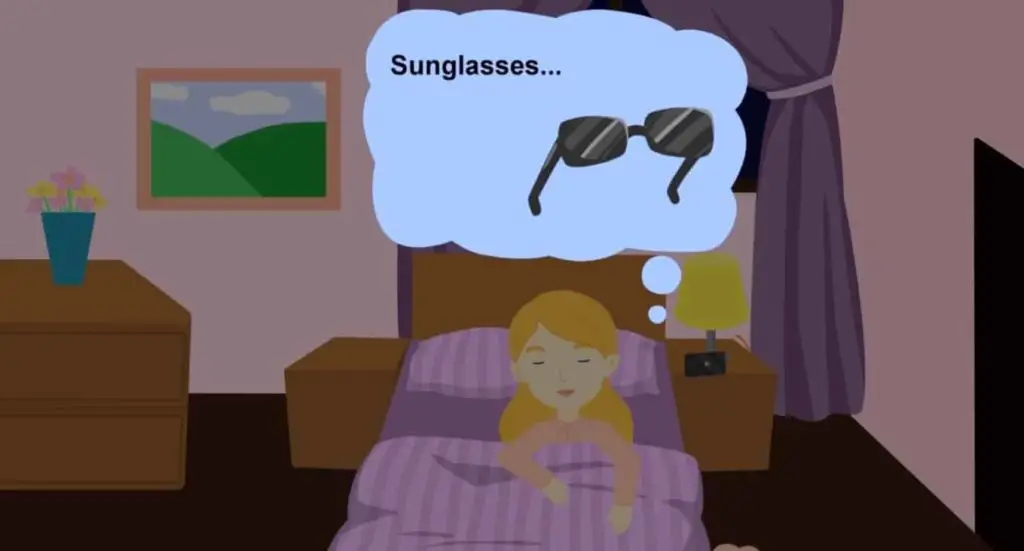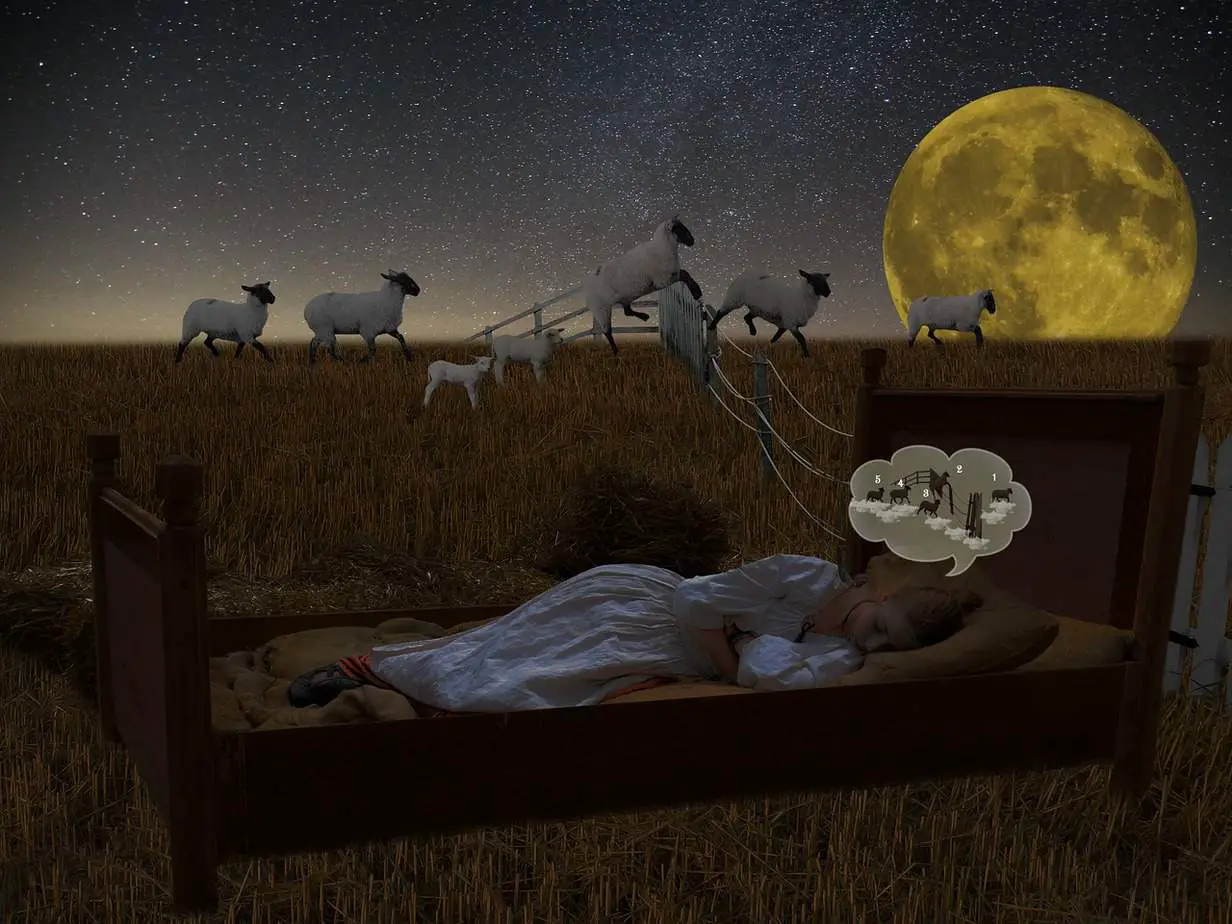Note: If you think the reason you are not sleeping well is an uncomfortable mattress, read our top online mattress reviews to find an affordable good quality mattress.
There are two types of sleepers; the lucky ones that can fall asleep in a minute and those who take forever just to feel sleepy.
If you take anywhere between 10 and 20 minutes to fall asleep, it's perfectly normal according to the National Sleep Foundation.
If you take longer than that, your sleep latency (the amount of time you take to sleep) could be an indication of an underlying problem. It could be a health issue or a serious sleep disorder but usually, it's our racing thoughts, stress levels and anxiety that keep sleep at bay.
In fact, anxiety about not sleeping is one of the common reasons for not sleeping.
Luckily your mind can be easily tricked to induce sleep faster. Here are some simple tricks you can try tonight.
But first, let’s take a behind-the-scenes peek at how your body falls asleep.
How Your Body Falls Asleep

Falling asleep does not work like a switch; one moment you are awake then click off you go into dreamland.
It’s much more complex than that. It’s a gradual process beginning with physical and mental relaxation then drowsiness begins to set in before transitioning into a fully-asleep mode.
Within these steps is a complex interplay of hormones, brain waves and muscle activity that eventually shut your body down (though a lot still happens in your brain while you sleep).
Factors like room temperature, what you are doing, time of day and diet influence your ability to fall asleep. Sometimes they can act like cues, telling your muscles to relax and your brain that you are ready for some shuteye.
You can use these cues to nudge your brain to trigger the sleeping process by relaxing your body and releasing the right hormones for sleep.
Here are some of the best mind tricks for sleeping, all of them backed by solid scientific research.
1. Cognitive Shuffling

You’ve probably heard of that age old trick of counting sheep to fall asleep. Another popular one is counting backwards. But these are usually not very effective at lulling your brain to sleep.
Luc Beaudoin, a university researcher in Vancouver, Canada has come up with a new and far more effective method. He calls it cognitive shuffling.
The trick involves feeding the mind random images and thoughts without any connections. As the brain struggles to visualize each thought, another one is quickly introduced and the brain has to jump to the new image.
This dissociated jumble of thoughts and images is quite effective at making you sleepy. There are two ways you can try out cognitive shuffling. The first is a word game.
Choose a random emotionally-neutral word with at least five letters. Take the first letter and come up with new words beginning with it. Try to visualize each word. When you run out of words, move on to the next letter.
Alternatively use his (paid) app called mySleepButton, available for both Android and iOS.
It does all the work for you. It will list random items for you, giving you only a couple of seconds to visualize each. You can set a timer and the app will turn off automatically when you sleep.
I haven't tried the app yet but looking at customer reviews, a good chunk of them say it actually helps them sleep faster.
2. Visualization
Cognitive shuffling relies heavily on random disjointed visualization to help you sleep. But even normal imagination can help.
Try to imagine yourself in your happy place. It can be a beach, a grass field or anywhere else that makes you feel content and happy. Gradually, that visualization will turn dreamy and you’ll find yourself falling asleep.
3. Rewind Through Your Day
Another visualization trick is to mentally walk back through your day. Start from when you got into bed and work your way backwards to when you got out of bed.
Focus on the little positive things that happened – a call to your mom, someone smiling at you, a joke you read online etc. Don’t dwell on any negatives.
4. Take a Glass of Milk – Sort Of
No, warm milk does not contain enough chemicals to help you sleep faster. This is a myth that has been repeatedly debunked.
What a glass of warm milk does is create a relaxing psychological effect. It helps you wind down and start the sleeping process.
If milk doesn't work for you, you can do any activity that helps you relax – folding clothes, reading a book, drawing, writing and so on. If you make a habit out of it, it will become a reliable ‘it’s time to sleep’ signal to your brain.
5. Lower the Temperature
Your body naturally cools down a bit as it approaches bedtime. In addition to the fading light, lower body temperature acts as one of the signals to your brain that bedtime is coming up.
If your bedroom is too warm, it could keep you from falling asleep quickly.
According to the National Sleep Foundation, the ideal temperature for sleep is between 60 and 67 degrees.
6. Listen to Rain

Ever wonder why cold rainy weather makes you sleepy? It’s mostly because of the reduced amount of natural light (which triggers the release of melatonin – the sleep hormone) and the lower temperatures.
Scientists also think that musty aroma of wet soil – which is caused by oils released from plants – is relaxing and can contribute to sleepiness.
Many people sleep faster and deeper on a rainy night.
But what about those days when there's no pitter-patter of raindrops to soothe you to sleep?
Try listening to artificial rain sounds. Even though it won't feel colder nor will you experience the sweet aroma of rained-on soil, digital rain can still trick your mind and body to relax and fall asleep.
There are plenty of apps you can use or you can listen to an audio recording on YouTube or your favorite music service.
7. Shower Earlier
You probably already know that a warm bath or shower helps you sleep better. To make this trick work best, move your shower time to earlier in the evening.
A hot shower too close to bedtime can actually make it more difficult to sleep because your core temperature is a bit high.
Showering around one and a half hours before bed gives your body time to cool down. This acts as a strong signal to your brain and body to wind down and sleep.
Note: Some tricks will work better in some people than others. Try several of them until you find the one that works best for you. If none works, check whether there are other problems such as a sleep disorder or an uncomfortable mattress.
Affiliate Disclosure
Affiliate Disclosure: I may earn a small commission (at no cost to you) if you purchase a mattress after clicking a referral link or using a coupon code on this site. That said, all content and opinions on this site are my own and are NOT affected by these payments.
This site participates in the Amazon Services LLC Associates Program, an affiliate advertising program designed to provide a means for sites to earn advertising fees by advertising and linking to Amazon.com.
*Amazon and the Amazon logo are trademarks of Amazon.com, Inc, or its affiliates.

